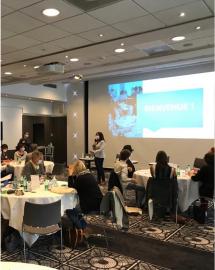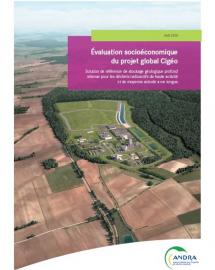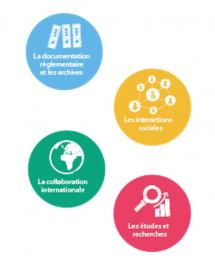How to think long term: lessons from radioactive waste management
For human societies, thinking over the long term is a fundamental issue: we have to anticipate social, economic or technical developments, anticipate the changes and the risks associated with them, adapt ourselves. This anticipation is all the more important today as our social systems are complex. We depend on advanced industrial infrastructure, cutting-edge technologies, which evolve ever faster. Human activities profoundly transform the world to the point of upsetting the natural balances. Social or economic cycles seem increasingly unpredictable.
Collectively, we must therefore be able to sense increasingly important transformations, while considering relevant ways of responding to them. This is the case, for example, with the climate crisis, which requires us both to consider the future of climate change, and to fundamentally redesign our social and economic systems to reduce our greenhouse gas emissions and adapt to a new climate reality. New technologies, social changes, ecological crises: all of this invites us to project ourselves into the future.
Thinking long term
In its own way, the management of radioactive waste is a unique part of this forward-looking approach, for which it can offer a number of lessons. It is in fact by definition a long-term stake, and even "long-term".The waste will remain radioactive for about 300 years (for "short lives") or even up to a few hundred thousand years (for "long life") and must be managed accordingly. The disposal facilities to thost them are also long-term projects, as is the case for example for the Cigeo project, the geological disposal center for the most radioactive waste: decades of research , over a hundred years of construction and operation, and a few hundred years of surveillance.
Thus, quickly in the history of the nuclear industry, the question arose of its long-term implications for waste. In the 1960s, technical questions appeared: rules were set, solutions were considered, experiments were carried out, then the first disposal facility was created in 1969: the Manche disposal facility. It was in 1979 that Andra was founded to institutionalize the consideration of these long-term issues.
The difficult anticipation of the future and the dialogue of the sciences
The debate which then settled on the management of radioactive waste was fueled by controversies and multiple questions: what are the advantages and disadvantages of the different management options? How to finance both? In what future economic and social contexts will this waste be managed? What will we bequeath to future generations? Benefit / risk assessment, economic and social forecasts, quantifications ... These are all themes that are often found when talking about long-term issues.
To answer these questions, it was necessary to mobilize the expertise of various disciplines: from nuclear physics to social sciences, including economics and geology. It was necessary to make these sciences work together, which often do not share the same methods or the same temporalities. And this is a major issue in prospective, which must compare knowledge to build the most accurate vision of possible futures. Moreover, it is this multidisciplinarity that can be found today in the working groups of the IPCC (1), or in public health institutions which are trying to develop the public health scenarios of tomorrow.
Today, Andra continues to engage in this process of multidisciplinary and scientific dialogue, since in addition to technical and scientific studies, it publishes, for example, a socio-economic assessment of the Cigéo project and deploys a program on the memory of disposal facilities, which mobilizes among others linguistics, archeology, or anthropology specialists.
Transform political processes to imagine tomorrow

The question of radioactive waste management also underlines the disconnection that may exist between the time needed to think about and manage long-term issues and the time which structures the political or social calendar. If for example political decisions had been taken as early as 1969 for the commissioning of the Manche repository for low and intermediate level waste, several decades have elapsed and many governments between the establishment of the nuclear industry in France (1950-1960) and the adoption of a structuring law to orient research on the management of the most radioactive waste: the Bataille law of 1991. It proves that relexion over these complex subjects requires time, and transcends traditional political deadlines.
During all these years and the following , the management of radioactive waste has also become a laboratory for collective discussion on the future. Initially considered primarily as a scientific and technical issue, the management of radioactive waste did in fact interfere in the political debate, then in society issues. More and more stakeholders have gradually become involved in this debate while new means of communication allow information to be shared with as many people as possible. It was therefore necessary to create the conditions for collective learning on a little-known subject, to conduct public debates, public inquiries, citizens' conferences, initiate discussion as soon as possible and mobilize citizens to take ownership of the subject, even make their contribution within the framework of consultations. A real experimentation in real conditions of participatory democracy, essential for the collective understanding of the subjects of the future.
 For three years, a group of economic experts has been advising Andra on the socio-economic assessment of Cigeo. This study aims to assess the interest of the project from an economic, but also societal and environmental perspectives. Is Cigeoa real advantage for society? How and according to what assumptions? Explanations and lessons with Émile Quinet, doctor of economics, professor emeritus at the Ponts-Paris Tech school and president of the group of expert-economists.
For three years, a group of economic experts has been advising Andra on the socio-economic assessment of Cigeo. This study aims to assess the interest of the project from an economic, but also societal and environmental perspectives. Is Cigeoa real advantage for society? How and according to what assumptions? Explanations and lessons with Émile Quinet, doctor of economics, professor emeritus at the Ponts-Paris Tech school and president of the group of expert-economists.
Find out more on the Socio-Economic Assessment
Andra Socio-Economic Assessment Constructing Cigeo today, an insurance against the uncertainties of tomorrow
Between reversibility and memory
In a very unique way, the management of radioactive waste bears witness to the complex issues surrounding foresight, long-term planning, and anticipation. At the heart of projects like Cigeo, we thus find concepts such as the principles of precaution or responsibility, with all the ethical questions they raise. The reversibility of dispsoal (2) during its operation is also important: what we choose to do today for the future involves future generations, we must then ask ourselves how to give them, too, the choice to do, to undo, or to do otherwise. Behind this question, there is also that of memory. Since we are talking about the long term, it is a question of knowing how to transmit information on radioactive waste and disposal for as long as possible, to preserve knowledge, but also know-how and skills.
Thinking long term is all of that. Respond to technical, political, economic and social questions. Make the disciplines work together to better anticipate and foresee. Dialogue, learn together, debate, to become aware of the decisions that will have consequences over decades, centuries and even thousands of years. An approach which consists, every day, in questioning oneself in order to find the most relevant way of thinking about this eminently important question for our future.
 Andra's Memory program is based on 4 pillars:
Andra's Memory program is based on 4 pillars:
- regulatory documentation and archives,
- societal interactions,
- international collaboration,
- studies and research.
Andra memory program
(1) Intergovernmental Panel on Climate Change.
(2) The law of July 25, 2016 defines reversibility as "the capacity, for successive generations, either to continue the construction and then the operation of successive stages of a repository, or to reassess the choices defined previously and to change management solutions ”.

